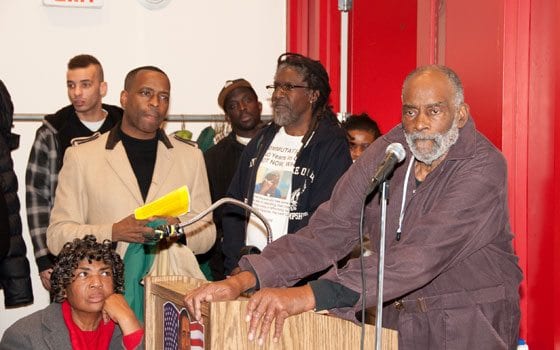

Author: Tony IrvingMel King, a longtime community activist, speaks to a packed audience imploring them to continue their show of opposition to the three-strikes bill at the proposed Conference Committee meeting scheduled for Jan. 12, 2012 at 2:30 p.m. at the Statehouse.

Author: Tony IrvingMel King, a longtime community activist, speaks to a packed audience imploring them to continue their show of opposition to the three-strikes bill at the proposed Conference Committee meeting scheduled for Jan. 12, 2012 at 2:30 p.m. at the Statehouse.

Author: Tony IrvingMel King, a longtime community activist, speaks to a packed audience imploring them to continue their show of opposition to the three-strikes bill at the proposed Conference Committee meeting scheduled for Jan. 12, 2012 at 2:30 p.m. at the Statehouse.
Black activists and elected officials are calling for a massive lobbying campaign to persuade the Legislature to veto or amend a controversial three-strikes law many say would have a devastating impact on the state’s black and Latino communities.
Members of the Massachusetts Legislative Black and Latino Caucus made their call for pressure on the Legislature and Gov. Deval Patrick during a packed meeting at the Dudley Branch of the Boston Public Library.
State Rep. Russell Holmes told the audience that Caucus members are working to slow the bill down and engage other legislators in dialogue about the legislation, which passed in the House with 146 votes in favor and only 12 against. Of the 12 opposition votes, eight came from the Black and Latino Caucus members present on the floor and four came from white Legislators.
State Rep. Byron Rushing said caucus members have to demonstrate to their colleagues that communities of color around the state are in support of their efforts to stop the bill. He urged attendees at the meeting to contact their legislators.
“I want everybody to call their state rep and tell them you support the Caucus on this,” he said. “I want you to ask your relatives and friends to call.”
Rushing and other caucus members said they will likely work to remove the provisions in the legislation that target nonviolent offenders. Caucus members and activists in the black and Latino community also voiced opposition to mandatory post-release supervision, saying that it would hamper ex-offenders in their efforts to obtain work.
In a meeting with the ethnic press Monday, the governor said he will not take a position on the legislation until it comes to his desk.
“We’re a long way yet from having a bill,” he said. “By the time it gets to me, it’s the end of the process.”
Patrick said he supports tougher sentences for habitual offenders and mandatory post-release supervision, but is opposed to laws that would send nonviolent offenders away for a life term. He said legislators will respond to pressure from the black community.
“They need to hear from people in the community,” he said.
The three-strikes legislation was drafted in reaction to a pair of high-profile slayings committed by career criminals who had been paroled. The most recent killing, the December 2010 slaying of a Woburn cop by career criminal Dominic Cinelli, prompted Patrick to overhaul the state’s Parole Board.
While activists at the meeting said they are in support of being tough on career criminals, they say the bill as it’s written could easily send nonviolent offenders away for life sentences.
“The third offence can be any felony,” noted Stephanie Soriano Mills, a member of the Boston Branch of the NAACP’s Legal Redress Committee and a former Suffolk County prosecutor. “In Massachusetts, we have 688 crimes that count as felonies.”
Under Massachusetts law, breaking and entering, assault and battery on a police officer, possession of marijuana with intent to distribute and unarmed robbery all count as felonies.
The House version of the legislation currently calls for people convicted of two felonies to receive the maximum penalty for their third, with no chance of parole.
Because the maximum penalty for unarmed robbery is a life sentence, that means many nonviolent offenders could end up serving life sentences, opponents of the legislation contend.
During the meeting at the Dudley Library, members of a panel discussion repeatedly urged the audience members to contact their state legislators.
“We need to be lobbying your legislators about what we don’t want in this bill,” said Barb Dougan, an attorney with Families Against Mandatory Minimums. “We also have to lobby our legislators about what we do want in this bill.”
One of the provisions Black Caucus members are backing is reduction in the School Zone law, which imposes mandatory minimum sentences for drug violations within 1,000 feet of a school. Because of the high concentrations of schools in urban communities, virtually all crimes occur in a school zone. Caucus members are calling for a reduction in the size of the zones, from 1,000 feet to 500.
In addition to the Black Caucus members, elected officials in attendance included state state Sen. Pat Jehlen, representatives William Brownsburger and Liz Malia — both of whom voted against the bill — and city councilors Ayanna Pressley, Tito Jackson and Charles Yancey. Representatives from the offices of U.S. Rep. Michael Capuano, state Sen. Sonia Chang-Diaz and At-Large Councilor Felix G. Arroyo also were present.
State Rep. Gloria Fox applauded the white legislators for their opposition to the legislation.
“This is not just a black and Latino issue,” she said. “It’s a human issue. They made a courageous decision to go against the [House ] leadership.”






